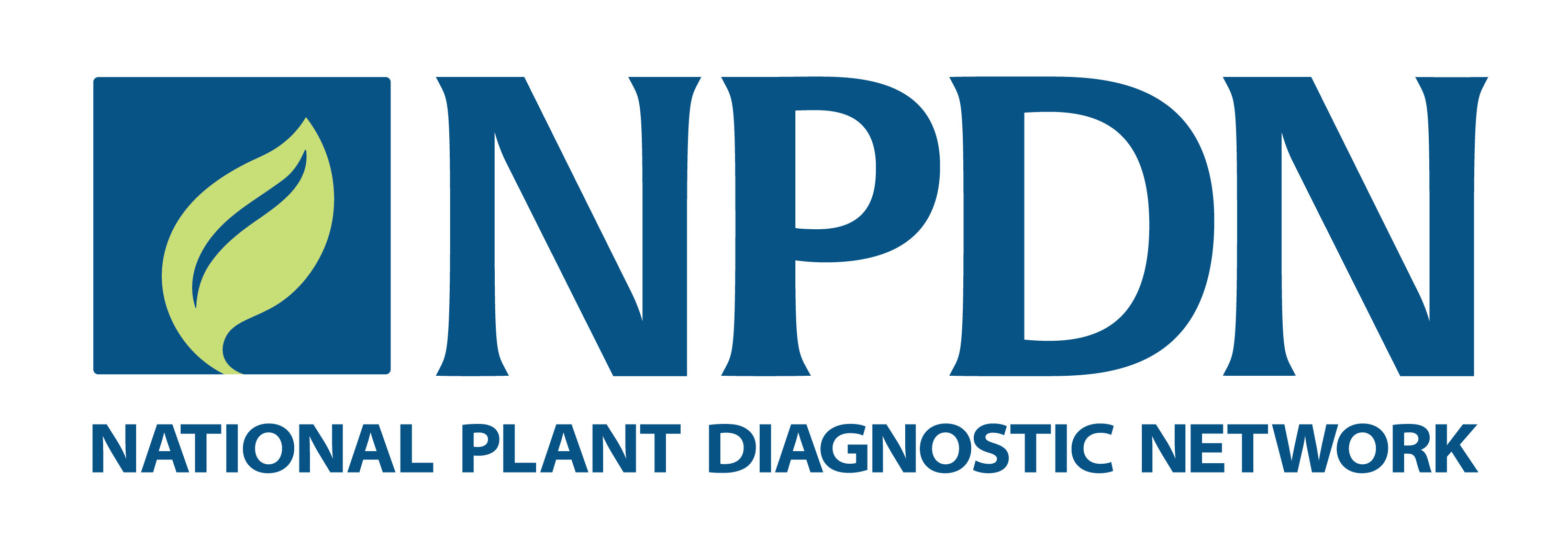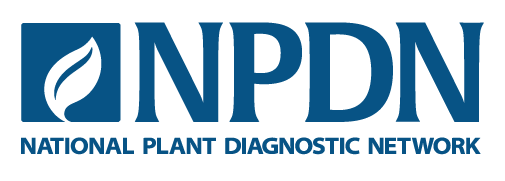Last updated: October 14, 2025
PPCDL workshops
General Best Laboratory Practices
This workshop is held virtually and is a prerequisite for all other NPDN trainings. The quality management portion of the lecture will discuss quality management systems vs ISO 17025 accreditation and the importance of record management in all aspects of quality management. The good laboratory practices portion of the lecture will discuss aseptic technique, preventing contamination and general recommendations for working in a laboratory.
Bioinformatics of Sanger Sequencing Workshop-Module SS
The Bioinformatics Module SS workshop is taught over 3 days and has both lecture and hands-on activities. The lectures will cover a range of sanger sequencing topics from primer design to introductory sequence analysis, as well as the molecular classification and diagnostics of a wide range of pathogens including bacteria, fungi, nematodes, Phytoplasmas, viruses and Phytophthora species. The hands-on portion of the workshop allows participants to analyze provided sequence data and use various bioinformatic tools for detection and diagnosis of plant pathogens. Participants also may analyze their own Sanger sequence data.
In recent years, this workshop has been presented using a virtual delivery format. Participants must have access to a computer. Presentation slides are text heavy, therefore, phones and tablets are not recommended. Participants must have access to Geneious prime software for the activities. Trial versions and monthly rental may be available if your institution does not own a license.
Bioinformatics of High Throughput Sequencing Workshop-Module HTS
The Bioinformatics of High Throughput Sequencing (HTS) is a 3-day lecture and hands-on based training that familiarizes participants with the latest in HTS technologies and analysis tools. The lectures will cover introduction to HTS technologies, its applications in plant pathogen diagnostics and data analysis pipelines.
The hands-on module will allow participants to analyze example datasets using various open-source sequence analysis software publicly available on the Galaxy server for detection of plant pathogens.
Citrus Canker Molecular Detection Workshop
The citrus canker molecular detection workshop is being offered in person for the first time in 2023. The workshop will have lecture and hands-on components. The lectures will cover the disease characteristics and an overview of citrus canker diagnostic testing at the USDA-APHIS-PPQ S&T Plant Pathogen Confirmatory Diagnostics Laboratory (PPCDL).
The hands-on portion of the training will focus on sample preparation, screening diagnostics and interpretation of results.
Citrus Health (HLB, citrus canker, CBS)
This 3-day citrus health workshop will cover screening diagnostics methods for three regulated citrus pathogens. Lectures will cover regulatory history, distribution, and biology for each of these three pathogens, as well as describing how these methods were developed and interpretation of assay results. Hands-on components of the training will include nucleic acid extraction methods and how to conduct these screening assays. Each pathogen will be the focus of one day in the workshop.
ELISA Fundamentals Workshop
This 2-day in-person workshop will cover all aspects of ELISA testing using commercially available kits. Lectures will cover the fundamentals of ELISA, different testing approaches and advantages and disadvantages of ELISA types with an emphasis on Good Lab Practice (GLP). The hands-on portion will give participants exposure to processing samples, the ELISA workflow and results interpretation.
Note: This workshop is not required in order to take the ELISA proficiency testing panel.
Experiential Bioinformatics of High Throughput Sequencing Workshop-Module EHTS 102
The Experiential Bioinformatics Workshop Module EHTS 102 Workshop is a 3-day, primarily hands-on based training that familiarizes participants with the latest in HTS technologies and analysis tools. A small group of up to 5 participants will generate their own MinION sequence data and analyze it using various sequence analysis software for detection and diagnosis of plant pathogens.
Participants must have completed the core NPDN Bioinformatics of HTS training and should be proficient in plant DNA/RNA extraction, PCR, and other molecular biology techniques.
Isothermal Amplification Workshop
The isothermal amplification workshop for 2023 will be offered in-person and will have lecture and hands-on components. The lecture will cover isothermal amplification technologies and assay design. The hands-on portion of the workshop will include nucleic acid extraction and loop-mediated isothermal amplification (LAMP) or recombinase polymerase amplification (RPA) targeting select bacterial and fungal pathogens.
Introduction to Sanger Sequencing (virtual half day)
The Introduction to Sanger Sequencing Workshop is a half day, virtual workshop designed to familiarize participants with the application of Sanger sequencing in plant disease diagnostics as well as best practices for analysis and interpretation of results. PPCDL scientists will cover a range of topics including the generation, processing, and analysis of Sanger sequences as well as provide case studies showcasing its application in the identification of a wide range of plant pathogenic viruses, bacteria, and fungi.
Pathogens covered include:
- Citrus Black Spot (Guignardia citricarpa)
- Citrus greening (Candidatus Liberibacter asiaticus)
- Ash Dieback (Hymenoscyphus fraxineus)
Monilinia
The Monilinia Detection Workshop was originally planned for its debut in March of 2020 but was pre-empted by a global pandemic. This 2-day workshop provides an introduction of Monilinia brown rot diseases of stone and pome fruit. There are two Monilinia species established in the US, and two exotic species in parts of Asia and Europe that are of regulatory concern. This workshop will review the similarities and differences among these species, demonstrate hands-on DNA isolation protocols and a conventional PCR assay that can be used to differentiate among those species.
Phytophthora 101 Workshop
The Phytophthora 101 Workshop is a 4-day program combining lectures with hands-on lab activities. The workshop covers DNA extraction methods from host woody and leaf tissue, real-time PCR protocols for diagnosing Phytophthora austrocedri (ITS and COX assays), the P. kernoviae complex (ITS1 and ITS2 assays), and P. ramorum (ITS and Elicitin assays), as well as results interpretation. Each day includes lectures, lab work, and discussions on participant results, troubleshooting, and best lab practices for optimal outcomes.
Phytophthora austrocedri Workshop
The Phytophthora austrocedri Workshop is a 1.5-day workshop that has lecture and hands-on components. Lecture materials include a review of Phytophthora austrocedri, DNA extraction from woody host tissue, and the real-time PCR protocol used for screening detection of P. austrocedri. The workshop will also include discussion of participant results, troubleshooting, and good lab practices to obtain optimal results. Participants must have taken Phytophthora 101 within the past three years to sign up for this workshop.
Phytoplasmas Molecular Detection Workshop
This 2-day workshop provides an introduction on Phytoplasmas, their taxonomy and disease symptoms associated with some of these bacterial pathogens of interest to APHIS PPQ. The hands-on portion of the training will focus on available phytoplasma-infected samples and cover sample preparation, DNA extraction/purification, molecular assays, and interpretation of results.
Plant Pathogen Diagnostic Certification Program (1-2 hr virtual)
This is a 1-2 hr virtual workshop that will provide an introduction about the Plant Pathogen Diagnostic Certification Program (PPDCP), which provides certifications for commonly used molecular techniques applicable for testing many plant pathogens in support of PPQ. This workshop will give an overview of the program, available certifications, overview of procedures for certification and timelines for the coming season. (Attendance of this workshop is not a requirement to obtain certification).
Potato Wart (Virtual)
This two-hour virtual workshop will provide lectures on the background, taxonomy, and morphological characteristics of Synchytrium endobioticum, the causal agent of Potato Wart. It will also include lectures on sample preparation, DNA extractions, real-time PCR analysis, and results interpretation.
Production and Validation of Diagnostic Assay Controls
This training will discuss the need and benefit of using validated assay controls, type of the controls and their production, followed by validation schemes to evaluate homogeneity and stability, and how to maintain and document traceability. It will be approximately 2 hrs. including Q and A.
Proficiency and Good Lab practices for DNA extraction and real time PCR
This two day, in-person workshop is designed for both new and seasoned diagnosticians who wish to have a refresher on the practical implementation of good lab practices using nucleic acid extraction and real-time PCR for plant disease diagnostics. The workshop will cover the basics of setting up a laboratory workflow for diagnostic testing, receiving and processing samples under a PPQ 526 permit, as well as the validation and implementation of diagnostic controls. Participants will gain hands-on experience in general nucleic acid extraction and real-time PCR techniques for plant disease diagnostics with emphasis on GLP.
Real-time PCR basics
This workshop is a virtual lecture. The lecture will introduce the basic principle of TaqMan Probe Real-time PCR, knowledge about the instruments, assay design / development, and method validation. Regarding applying the knowledge in problem solving, examples from our practices will be discussed in, e.g., methods for detection of HLB (aka. Citrus greening), Citrus Variegated Chlorosis (CVC), Bacterial Blight of rice.
Pathogens exemplified in the lecture include:
- Huanglongbing, aka. Citrus Greening (“Candidatus” Liberibacter asiaticus)
- Citrus Variegated Chlorosis (Xylella fastidiosa CVC strains)
- Bacterial Blight of rice (Xanthomonas oryzae oryzoe vs. X. oryzae USA strains)
Seed Pathogen Testing Workshop on CGMMV, ToBRFV, Popsiviroids
This is a 2-day workshop that has lectures and a hands-on training component. Lectures include a background of seedborne viral diseases of cucurbits and solanaceous plants and review of methods for the detection and identification of seedborne viral pathogens, focusing on nucleic acid extraction principles and methods of manual and high throughput extraction from seeds. The hands-on portion of the training will focus on manual and high throughput nucleic acid extraction from cucurbit and solanaceous seeds. Robotic nucleic acid extraction training will be provided on ThermoFisher Scientific KingFisher Apex nucleic acid purification systems.
Sample Submission for Confirmatory Diagnostic Testing
This virtual workshop will describe how to submit suspect samples, including Select Agents, for regulatory confirmatory diagnostic testing at the PPCDL. The presentation will focus on answering questions about the steps of the diagnostic process, sample quality, shipping procedures, and who needs to be contacted at various steps. Questions covered include: What determines if a sample needs confirmatory diagnostic testing? How to start the process of submission? Who needs to be informed or contacted? How are results reported and to whom? What materials need to be included in the shipment? Where is the suspect sample sent? How does one learn if steps are changed? Participants will also have ample time to ask their own questions. A remote hands-on exercise will be included to evaluate sample submission procedures and provide feedback to participants. Course completion is dependent upon completing the hands-on exercise.
Other workshops
Morphological Fungal Identification Techniques Workshop (MFIT)
The MFIT Workshop consist of lectures and hands-on activities. Participants will learn about fungi in the Ascomycota and Basidiomycota, learning precise terms for specific characters, and increasing familiarity with reading and understanding species descriptions ranging from those written 100 years ago to the present. Participants will learn techniques and access literature that may be unfamiliar and, in some cases, difficult to obtain. Approximately 20 hours of the 3-day workshop will focus on interactive, hands-on activities. The hands-on portion will include directed examination of samples from both Phyla under the dissecting and compound microscopes, learning targeted isolation techniques using local fresh samples collected or maintained for the workshop.
Advanced Nucleic Extraction and qPCR Training
This hands-on training is designed for labs that currently use a Kingfisher or other magnetic bead DNA/RNA extraction equipment. Participants receive step-by-step instruction and practical experience in:
- Nucleic acid extraction from a range of sample types
- Design, validation, and deployment of real-time PCR assays
- Nucleic acid quantification methods
- Interpretation of results and troubleshooting
- Introduction to loop-mediated isothermal amplification

